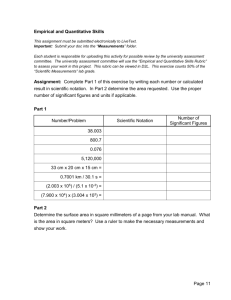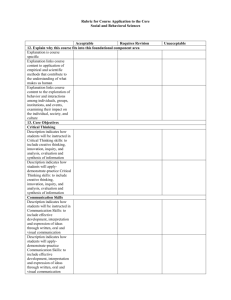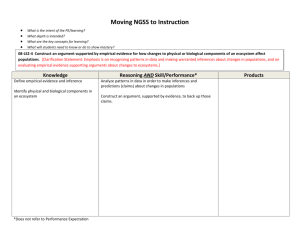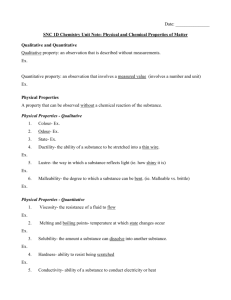Is Political Science a Science (and related
advertisement
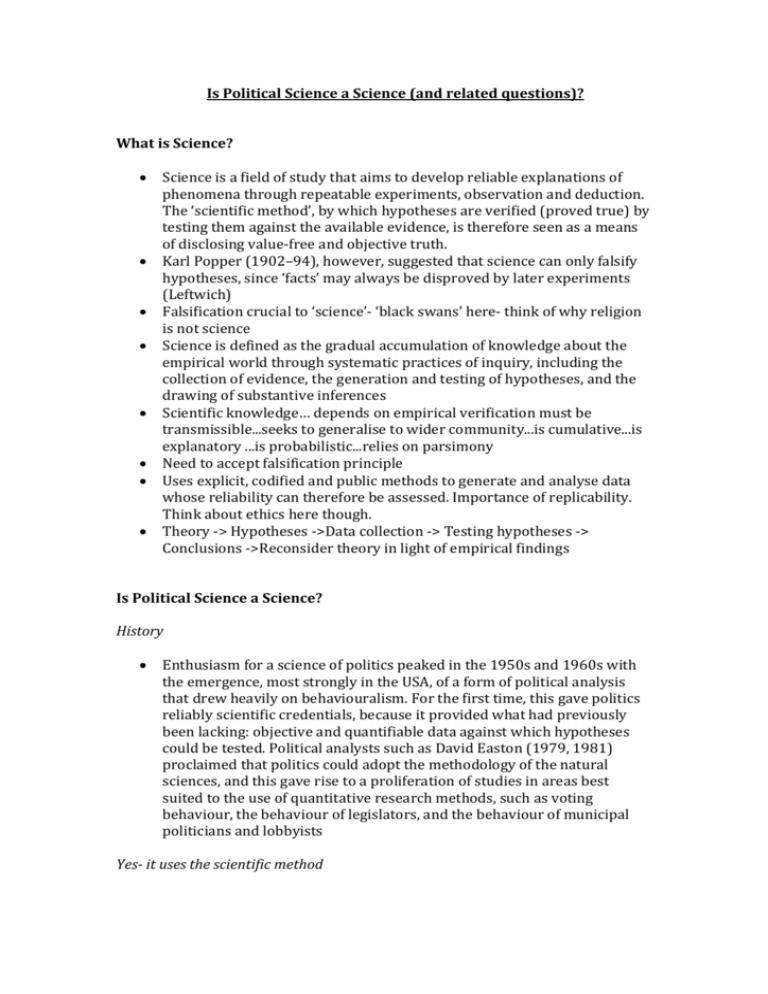
Is Political Science a Science (and related questions)? What is Science? Science is a field of study that aims to develop reliable explanations of phenomena through repeatable experiments, observation and deduction. The ‘scientific method’, by which hypotheses are verified (proved true) by testing them against the available evidence, is therefore seen as a means of disclosing value-free and objective truth. Karl Popper (1902–94), however, suggested that science can only falsify hypotheses, since ‘facts’ may always be disproved by later experiments (Leftwich) Falsification crucial to ‘science’- ‘black swans’ here- think of why religion is not science Science is defined as the gradual accumulation of knowledge about the empirical world through systematic practices of inquiry, including the collection of evidence, the generation and testing of hypotheses, and the drawing of substantive inferences Scientific knowledge… depends on empirical verification must be transmissible...seeks to generalise to wider community...is cumulative...is explanatory ...is probabilistic...relies on parsimony Need to accept falsification principle Uses explicit, codified and public methods to generate and analyse data whose reliability can therefore be assessed. Importance of replicability. Think about ethics here though. Theory -> Hypotheses ->Data collection -> Testing hypotheses -> Conclusions ->Reconsider theory in light of empirical findings Is Political Science a Science? History Enthusiasm for a science of politics peaked in the 1950s and 1960s with the emergence, most strongly in the USA, of a form of political analysis that drew heavily on behaviouralism. For the first time, this gave politics reliably scientific credentials, because it provided what had previously been lacking: objective and quantifiable data against which hypotheses could be tested. Political analysts such as David Easton (1979, 1981) proclaimed that politics could adopt the methodology of the natural sciences, and this gave rise to a proliferation of studies in areas best suited to the use of quantitative research methods, such as voting behaviour, the behaviour of legislators, and the behaviour of municipal politicians and lobbyists Yes- it uses the scientific method The content of ‘science’ is primarily the methods and rules, not the subject matter, since we can use these methods to study virtually anything (KKV). The empirical approach to political analysis is characterized by the attempt to offer a dispassionate and impartial account of political reality. The approach is ‘descriptive’, in that it seeks to analyse and explain, whereas the normative approach is ‘prescriptive’, in the sense that it makes judgements and offers recommendation The strong case for a science of politics suggests that both (comparative) political science and natural science share the same basic goals, namely, description, classification, hypothesis-testing, and prediction. Both activities require the systematic collection of evidence; an ordering of the evidence and the search for discernible patterns; the formulation and testing of contending explanations for the occurrence of the patterns; and the building of more general theories. Thus, a science of politics always contains this ‘evidence-inference methodological core’ (Almond 1996:52), or the ‘customary pair’ of theory and observation (Feyerabend 1993:23; see also Gordon 1991: 589–634). Never possible to definitively establish a causal relationship exists but is possible to determine how far a particular set of empirical observations are consistent with a specific proposition about a cause and effect relationship Pro- science view: argues that the world of politics consists of important empirical puzzles to which political scientists apply a set of theories and methods in order to provide meaningful explanation and understanding It accepts that these statements are imperfect and uncertain, but by advocating systematic and well-grounded ‘procedures of inquiry’ tit aims to help students of politics make such statements the best that they can be. Neither scientist had actually seen evolution or gravity but merely observed its effects. In this way, evolution and gravity are mental constructs, whose repeated empirical verification has given them a lawlike status. Yes-it collects evidence in a scientific way Political scientists also collect evidence systematically (e.g. archival records, interviews, official statistics, histories, or surveys), search for discernible patterns in the evidence, and formulate theories to account for those patterns. In comparative politics, the political scientist compares countries in an effort to verify the theories that have been formulated. Thus, both the natural and political sciences seek to make inferences based on the empirical world they observe, and both seek to maximize the certainty of these inferences. Despite these general similarities between natural science and political science, there remain two important (albeit not absolute) differences: experimentation and the generation of scientific ‘laws’. Depends on Definition? Perhaps all depends on how you define a science- you adopt a minimalist approach- quite clear that political science is a science in as far as it offers ordered knowledge based on systematic enquiry How does Political Science differ from the Natural Sciences? i The first difference between natural science and political science is the role of experimentation. Advances in natural science are generally supported by evidence gathered through experimentation, which involves the controlled manipulation of the subject under study in an effort to isolate causal factors. Evidence in political science, on the other hand, tends not to be gathered through experimentation, even though some political scientists use experiments in their research (e.g. those who work on game theory, focus groups, and ‘citizen-juries’). Comparative politics, in particular, cannot use experimentation for both practical and ethical reasons. For example, it would be impossible to re-run the same election in the same country with a different electoral system to observe the differences in the outcome of the two systems. Ethically, it would be impossible to redistribute income intentionally in a developing country to see if civil strife erupts. Both these examples demonstrate the need for using counterfactuals, or situations in which the researcher imagines a state of affairs where the antecedent factors to a given event are absent and where an alternative course of events or outcomes is considered (Ferguson 1997b). Whether it is different electoral systems, different distributions of income, different levels of economic development, or the absence of particular revolutionary groups, political scientists implicitly suggest a counterfactual situation when making claims about important explanatory factors Without being able to do experiments, social science seeks to make generalizations based on the best available evidence (Campbell and Stanley 1963; Lijphart 1975:162; Lieberson 1987). As a substitute for experimentation, comparison allows for control (Sartori 1994:16), holding certain things constant while examining and accounting for observed differences . The second difference between natural science and political science involves the law-like status that is given to certain scientific theories. Experimentation and repeated empirical verification give theories in the natural sciences the status of laws (e.g. the law of conservation of energy, Newton’s laws of motion, or Boyle’s Law of Gases); however, the nature of evidence marshalled in support of theories of political science is such that law-like generalizations are rare (Iron Law of Oligarchy, Duverger’s Law, Democratic Peace Empirical vs Normative Studies of Politics There are two basic types of theory in political science, normative and empirical. Normative theory specifies how things in society ought to be, given a desired set of outcomes and philosophical position In contrast, empirical theory seeks to establish relationships between two or more concepts in an effort to explain the occurrence of observed political phenomena. The origins of political analysis date back to Ancient Greece and a tradition usually referred to as ‘political philosophy’. This involved a preoccupation with essentially ethical, prescriptive or normative questions, reflecting a concern with what ‘should’, ‘ought’ or ‘must’ be brought about, rather than with what ‘is’- political theorists still very concerned with these questions- as are the rest of us! (albeit perhaps to a lesser extent) Although such analysis may be carried out critically and scrupulously, it cannot be objective in any scientific sense, as it deals with normative questions such as ‘Why should I obey the state?’, ‘How should rewards be distributed?’ and ‘What should the limits of individual freedom be?’ Behaviouralism, however, came under growing pressure from the 1960s onwards. In the first place, it was claimed that behaviouralism had significantly constrained the scope of political analysis, preventing it from going beyond what was directly observable. Although behavioural analysis undoubtedly produced, and continues to produce, invaluable insights in fields such as voting studies, a narrow obsession with quantifiable data threatens to reduce the discipline of politics to little else. More worryingly, it inclined a generation of political scientists to turn their backs on the entire tradition of normative political thought. Concepts such as ‘liberty’, ‘equality’, ‘justice’ and ‘rights’ were sometimes discarded as being meaningless because they were not empirically verifiable entities.- shows potential downside of Political ‘Science’ Modern behaviourlists- are determined to advance their work and those of others through the generation of empirically falsifiable predictions that can be tested against observations One school of thought: assumes there are observable political events, actors, interests, structures, and outcomes about which political scientists can make reasoned, informed, and intelligent analytical statements. Variously called ‘positivism’, ‘behaviouralism’, or ‘post-behaviouralism’ (Fay 1975; Von Wright 1971; Sanders 1995; Lane 1996; Flyvberg 2001; Brady and Collier, 2004; Caterino and Schram 2006), this style of political science concentrates on observable political behaviour and events at the individual, group, or national level, and assumes that explanations of that behaviour are ‘susceptible to empirical testing’ (Sanders 1995:58) Can we be objective studying politics? Yes- should be looking to explain/understand, should use scientific method, should be able to distance ourselves from allegiances/biases No- impossible to be neutral- we are all creatures of our own circumstances, should acknowledge our own biases, people rarely drawn to study of politics through a disinterested quest for knowledge alone, post-positivist theories- there is no single overarching truth out there Positivists who follow the style of the natural scientists and establish casual relationships developing explanatory or even predictive models vs realists who do not privilege direct observation but see explanation of reality as often lying in deep structures that cannot be observed. Idea that the world is so deeply socially constructed there is little ‘real world’ for political scientist to study What is Quantitative Research? Quantitative Research uses numbers and statistical methods. Tends to be based on numerical measurements of specific aspects of phenomena; it abstracts from particular instances to seek general description or to test causal hypotheses; it seeks measurements and analyses that are easily replicable by other researchers. Quantitative data can be official aggregate data published by governments on growth rates, revenues and expenditures, levels of agricultural and industrial production, crime rates and prison populations, or the number of hectares of land devoted to agrarian reform. Quantitative data can also be individual, such as that found in the numerous market research surveys and public opinion polls. Quantitative methods are based on the distributions these data exhibit and the relationships that can be established between numeric variables using simple and advanced statistical methods What is Qualitative Research? Qualitative research covers a wide range of approaches but by definition, none of these approaches relies on numerical measurements. Such work has tended to focus on one or a small number of cases, to use intensive interviews or in depth analysis of historical materials, to be discursive in method, and to be concerned with a rounded or comprehensive account of some event or unit Qualitative methods seek to identify and understand the attributes, characteristics, and traits of the objects of inquiry, and the nature of the method necessarily requires a focus on a small number of countries. In comparative politics, there are three broad types of qualitative methods: macro-historical comparison (and its three subtypes) (Skocpol and Somers 1980; Ragin et al. 1996); in-depth interviews and participant observation (Devine 1995); and what is variously called inter- pretivism, hermeneutics, and ‘thick description’ (Geertz 1973; Fay 1975) Quantitative vs Qualitative ‘debate’ Pol scientists debate the merits of case studies vs statistical studies, area studies vs comparative studies and ‘scientific’ studies using quantitative methods vs ‘historical’ investigations relying on rich textual and contextual understanding. Patterns and trends in social, political or economic behaviour are more readily subjected to quantitative analysis that is the flow of ideas among people or the difference made by exceptional individual leadership Such scholarship also includes normative analysis. Simply put, quantitative methods seek to show differences in number between certain objects of analysis and qualitative methods seek to show differences in kind. Over the years a division in political science has developed between those who use quantitative methods and those who use qualitative methods however, it seems that this division is a false one if both methods adhere to the goal of making inferences from available evidence Hallmarks of Good Empirical Research (Qualitative & Qualitative): KKV goal- design research that will produce valid inferences about social and political life Universal logic of inference for both quantitative and qualitative research Best research often combines quant and qual. In same research project some data may be collected that is amenable to statistical analysis, while other equally significant information is not. Hallmarks of good studies: Make inferences beyond the direct observations collected. Reaches uncertain conclusions- reaching perfectly certain conclusions from uncertain data is obviously impossible. Importance of falsifiability here as well- key for ‘science’. When constructing theories think of observable implications (dinosaurs and iridium) 4 stages of research design- the research question, the theory, the data and the use of data Theories must be falsifiable and be capable of generating as many observable implications as possible- either collect more observations on the same dependent variable or record additional dependent variables Collect data on as many observable implications as possible Important to maximise the validity of measurements. Validity means measuring what we think are measuring. Careful with proxies here. Ensure data collection methods are reliable- reliability means applying the same procedure in the same way will always produce the same measure. Reliable measures produce the same results when applied by different researchers and this outcome depends, of course, upon there being explicit procedures that can be followed. All data and analyses should, insofar as possible be replicable. Replicability applies not only to data, so that we can see whether or measures are reliable but to our whole reasoning process in producing conclusions. Not always possible in qualitative studies obviously…ethics as well here Avoid selection bias (choosing only cases that support theory or using a sample that is not representative) or omitted variable bias (Ice Creams and drowning, Cambridge wine budgets & exam results). Dependent variables should be dependent- shouldn’t cause change in explanatory variables! Dependent variable must vary (Don’t just study successful revolutions!) Choose observable concepts rather than unobservable ones where possible for DV- makes the empirics much easier/less prone to erroralthough does restrict what you can do Key term used throughout the discussion was inference. Simply put, making an inference is ‘using facts we know to learn something about facts we do not know’ (King et al. 1994:119 after Mill; see also Couvalis 1997). Gabriel Almond (1996) observes that ‘the object of political science . . . is the creation of knowledge, defined as inferences or generalizations about politics drawn from evidence’; and Mayer (1989:56) claims that ‘comparative analysis . . . [is] a method that plays a central role in the explanatory mission of political science itself’ For more see: What is politics?: the activity and its study edited by Adrian Leftwich Issues and Methods in Comparative Politics – Todd Landman Chapter 1 Theory and methods in political science by David Marsh and Gerry Stoker (eds) Designing social inquiry : scientific inference in qualitative research by Gary King, Robert O. Keohane, Sidney Verba
